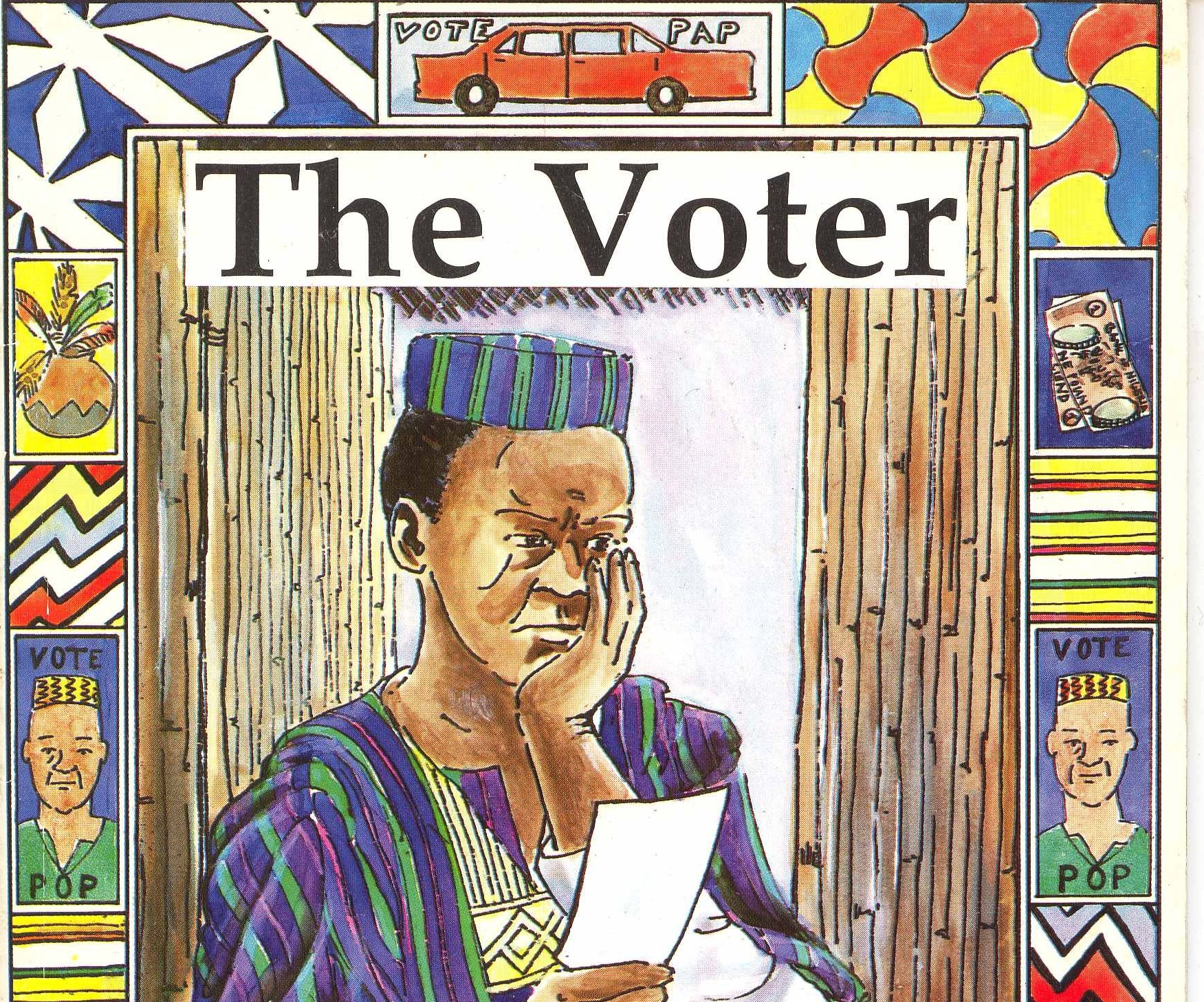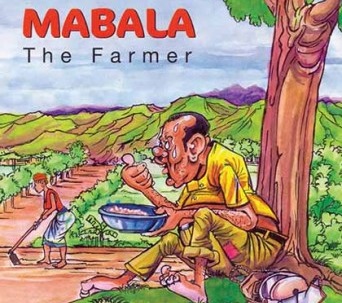THE VOTER BY CHINUA ACHEBE
TITLE: THE VOTER
AUTHOR: CHINUA ACHEBE
GENRE: SHORT STORY
INTRODUCTION
SUMMARY OF THE STORY
THE VOTER
CONTENTS
ANALYSIS OF THE FORM
- The title
- The setting
- Style and other Literary Techniques
- The plot
- Characterization
- Language
ANALYSIS OF CONTENT
- Theme
- Conflict
- Message
- Lessons (Morals)
- Philosophy
- Relevance of the Story
THE TITLE
THE SETTING
THE PLOT
The story talks about Mr. Rufus Okeke. He is a bicycle repairer who influences people in his village in political affairs. He is popularly known by his people as Roof. The whole villagers support the People’s Alliance Party (PAP), the party that Roof campaigns for. The party’s candidate is Mr. Marcus Ibe. Marcus Ibe was formerly a school teacher but he later on becomes the politician and the Minister for Culture. Ibe is a Member of Parliament as well. He is very tough in his constituency that he does not want any person to oppose him during election.
Roof is again behind Mr. Marcus Ibe who again wants to participate in the fourth coming election. Roof is believed to have a great convincing power. Thus, he is almost listened by all people of different ages and status. The writer says about Roof;
“He had become a real expert in election campaign at all levels – village, local government or national.”
Normally, voters do not need money form their leaders but to solve their problems like construction of infrastructures, better healthcare, and education for their children. But most of the time, voted leaders do not remember the voters. It is even said that it is only their money which helps them to be elected. Even after five years of being in leadership, they go back to the local people to ask for the vote. This is what happens to the people of Umuofia village.
For five years villagers have seen the continuous richness among politicians. For example, before becoming the MP and Minister, Marcus Ibe was a mere mission school teacher with dreary life, but after joining politics he has become among the richest people owning luxurious cars and beautiful houses. In fact, Marcus Ibe does not help his people at Umuofia but he just enriches himself by investing in a lot of things and in different places. The author says;
“..he had two long cars and had just built himself the biggest house anyone had seen in those parts”.
To fool people, Marcus Ibe prepares a big feast (party) at the time he opens his biggest house nicknames ‘Umuofia Mansions’. He slaughters five bulls and countless goats to entertain his people, and people are satisfied with these little things in life compared to the cost of their votes. Everyone at that party praises him. One old man called Ogbuefi Ezwnwa even says;
“Our son is a good man; he is not like the mortar which as soon as food comes its way turns its back on the ground”.
When the election times approaches, as usual, Roof plays a great role in the campaign to make sure that Marcus Ibe returns back to his position. In the campaign, Roof collects the elders in the house of Ogbuefi Ezenwa and bribe them to vote for Marcus Ibe during election. Ezenwa himself says;
“We shall every one of us drop his paper for Marcus. Who would leave an Ozo feast and go to a poor ritual meal? Tell Marcus he has our papers and our wives’ papers too.”
All these things are done in order to defeat Mr. Maduka of Progressive Oraganisation Party (POP) during election. Maduka stands for POP, competing with Marcus Ibe. POP also prepares a lot of money for its campaign. The author says;
“No one knew for certain how much money POP had let loose in Umuofia but it was said to be very considerable. Their local campaigners would end up very rich, no doubt”.
In the last days of the campaign when all campaigners were doing what they could do, unexpectedly Roof receives a strange visit which is led by the campaign manager of the POP. The man has decided to go to Roof to bribe him, so that he votes for Maduka. Roof is given five pounds on this issue. The writer says’
“No words were wasted. He places five pounds on the floor before and said ‘ We want your vote’”.
Roof decides to take the money and he has to swear before the ‘iyi’ that he will vote for Maduka and if he fails to do so he has to be harmed by the iyi. Iyi is a charm or a curse, so Roof agrees to all these conditions considering that there is much money it the deal.
At the Election Day, Marcus Ibe sits aside shaking hands with different people and Roof at another side playing his role to make sure Marcus Ibe wins the election. The writer says;
“Roof and the other organizers were prancing up and down giving the last-minute advice to the voters and pouring with sweat”.
As the voting time nears, Marcus Ibe suggests Roof to be the first person for PAP campaigning team to vote. He tries to hide the bribery and swear he took to vote for Maduka.
He finds it hard to betray Marcus Ibe even in secret. He spends a lot of time in voting booth. What would he do since he had sworn before iyi that he would vote for Maduka?
After spending a long time in the voting booth, thinking about what to do, he finally decides to tear the paper into two pieces then puts half of each in each box, Marcus and Maduka. By doing so, his vote becomes automatically invalid since it doesn’t work for it is torn apart.
Thus, Roof makes a surprising decision. He rips his paper (ballot) in half, for he has rationalized that his actions to each candidate make a vote for either ‘the right thing to do’.
CHARACTERISATION
PROTAGONIST: He is the protagonist/main character in the story.
POPULARITY: He is a young, energetic and popular man in his village.
POVERTY: He is poor as he works as a bicycle repairer.
LEADERSHIP: He is a leader of the PAP campaigning team. He is a campaign manager for the PAP, party of Marcus Ibe.
PERSUASIVENESS: He has a great convincing power such that he can be listened by all people in the village.
MONEY: He is just a money monger; that is why, he betrays Marcus Ibe because of money (five pounds) from POP.
TRUST: He is also seen as a trustworthy person.
CORRUTION: He is also corrupt though he still thinks about Marcus Ibe.
Marcus Ibe
POLITICAL CANDIDACY: He is a candidate for PAP.
TEACHER: He was formerly a professional mission school teacher.
POLITICIAN: He later enter into politics and become MP and Minister.
BETRAYAL: He does not help his voters.
CORRUPTION: He is a corrupt person.
IRRESPONSIBILITY: He is irresponsible leader for his people.
SELFISHNESS: He is selfish.
HYPOCRISY: He is hypocritical leader.
POLITICAL CAMPAIGN: His campaign is led by Roof and it supplies money to bribe the people.
Mr. Maduka
POLITICAL CANDIDACY: He is a candidate who contested the seat for POP.
CORRUPTION: He is corrupt as well as his party has supplied the money to bribe the voters.
WITCHCRAFT: He believes in witchcraft because his campaign manager forces Roof to swear before iyi.
BRIBERY: He bribes Roof by giving him five pounds when he sends his campaign manager to Roof.
SELFISHNESS: He is selfish.
IRRESPONSIBILITY: He is also an irresponsible leader.
Maduka’s Campaign Manager
SUPERSTITION: He is superstitious.
CORRUPTION: He is corrupt.
IRRESPONSIBILITY: He is irresponsible.
SELFISHNESS: He is selfish.
Ogbuefi Ezenwa
CORRUPTION: He is corrupt.
IGNORANCE: He is ignorant.
IRRESPONSIBILITY: He is irresponsible as a high traditional leader.
TRADITIONAL LIFE: He is traditionalist.
SELFISHNESS: He is selfish as he cares for money.
BAD EXAMPLE: He is a bad example to the society as he is an elder and he stills behaves in bad manners.
OTHER CHARACTERS:
Campaign managers
Elders
Villagers
LANGUAGE
The author has used a simple language for everyone to understand. His choice of words reflects the use of everyday language to the people of Umuofia Village and other contemporary societies. The author has also applied the following figures of speech:
Exaggeration
“He had become a real expert in election campaign at all levels – village, local government or national.”
In this statement, the writer explains Okeke’s fame in the world of politics in an exaggerated way.
Simile
One of the old men of Umuofia Village, Ogbuefi Ezwnwa, says;
“Our son is a good man; he is not like the mortar which as soon as food comes its way turns its back on the ground”.
ANALYSIS OF THE CONTENT
THEMES
The following issues/themes have been expressed by the writer in this story:
Irresponsibility.
This is the situation of failing to fulfil the needs to the people as a leader. In the short story, Marcus Ibe and other politicians are portrayed as irresponsible leaders because they promise their people many things like construction of roads but they do not fulfil their promises.
Selfishness.
This is a situation where a person only cares for his or her own needs without considering others. In the short story, Marcus Ibe and Maduka as well as other politicians are examples of the selfish leaders. They only want to benefit themselves not the people. For example, in the story, Marcus Ibe build a new house and install it with water and electricity while the whole village has no electricity and it has shortage of water.
Elections and Political campaigns.
The author shows how politics is practised in the village of Umuofia and other contemporary societies. For instance, when the election times approaches, as usual, Roof plays a great role in the campaign to make sure that Marcus Ibe returns back to his position. In the campaign, Roof collects the elders in the house of Ogbuefi Ezenwa and bribe them to vote for Marcus Ibe during election. Ezenwa himself says;
“We shall every one of us drop his paper for Marcus. Who would leave an Ozo feast and go to a poor ritual meal? Tell Marcus he has our papers and our wives’ papers too.”
Corruption and bribery.
It refers to the private gain on the public properties. In the story, most politicians like Marcus, Maduka, Rufus, and others are all corrupt. They bribe people so that they can vote for them during election. Even Rufus bribes the elders in the house of Ogbuefi Ezenwa.
Unawareness.
It is a situation of not realizing the presence of violation of justices in the society. For example, in the story, people are unaware that politicians like Marcus Ibe are stealing from them and are irresponsible leaders.
Betrayal.
It is the situation of going against the certain agreement made between two or more people. In the story, for example, Rufus Okeke betrays Marcus Ibe for voting for Maduka and in the process he destroys his paper.
Ignorance.
The situation of not knowing or not having certain knowledge on something. It is simply defined as a lack of knowledge on something. For instance, in the story, most villagers are ignorant that they are being cheated by the politicians. Some of them even believe that even studied Doctorate in Geography or Politics can mean that the person can also attend the patients. Another example is when people are easily cheated by the politicians with feasts, money, foods, and fake promises. For example, at Election Day, Roofs says:
“Don’t forget. Our sign is the motor car. Like the one Marcus is sitting inside. It is the same car. The box with the car shows on its body is the box for you. Don’t look at the other with the man’s head: it is for those whose heads are not correct”.
African traditions and beliefs.
The iyi is often used by the politicians to get more people to vote for them in this society. For example, POP campaigning team goes to Rufus to bribe him. It also gives him an iyi for him to swear that he’ll vote for Maduka. The author says;
“The man nudged his companion and he brought forward an object covered with red cloth and proceeded to remove the cover. It was a fear-some little affair contained in a clay pot with feathers stuck into it. This iyi comes from Mbanta. You know what that means. Swear that you will vote for Maduka. If you fail to do so, this iyi to note”.
Beliefs in gods.
Supersitions and witchraft.
CONFLICT
Intrapersonal conflict. Rufus Okeke suffers intrapersonal conflict when he is confronted with the dilemma on who he has to vote for.
Maduka’s Progressive Oraganisation Party (POP) vs Marcus Ibe’s People’s Alliance Party (PAP)
POP Campaign team vs PAP Campaign team.
Marcus Ibe vs Mr. Maduka
Rufus Okeke vs Mr. Maduka’s campaign manager
MESSAGE OF THE STORY
The story gives the message to the most African countries and people who do not conduct free and fair elections. In most of the African countries, politicians bribe the voters so that they can win. The author therefore intends to correct these vices and injustices done by the political leaders during campaigns, elections and when they are in power.
PHILOSOPHY OF THE STORY
Political tolerance is the philosophy or belief of the writer of this story. The writer believes that when it comes to politics, people should be tolerant.































































Thanks to my father who shared with me regarding
this webpage, this website is in fact awesome. asmr 0mniartist
Hi! Someone in my Facebook group shared this website with us so I
came to look it over. I’m definitely loving the information. I’m book-marking and will be tweeting this to my followers!
Great blog and fantastic style and design. 0mniartist asmr
I’m impressed, I must say. Seldom do I come across
a blog that’s both equally educative and amusing, and
without a doubt, you’ve hit the nail on the head. The issue
is an issue that too few people are speaking
intelligently about. I’m very happy I stumbled across this in my search for something regarding this.
0mniartist asmr
Everyone loves what you guys tend to be up too. This kind of clever work and reporting!
Keep up the good works guys I’ve added you guys to our
blogroll. 0mniartist asmr
Thanks on your marvelous posting! I seriously enjoyed reading it, you
can be a great author.I will make sure to bookmark your
blog and will come back later on. I want to encourage
you to ultimately continue your great work, have a nice afternoon! 0mniartist asmr
Asking questions are truly fastidious thing if you are not understanding something
entirely, however this piece of writing gives pleasant understanding even. 0mniartist asmr